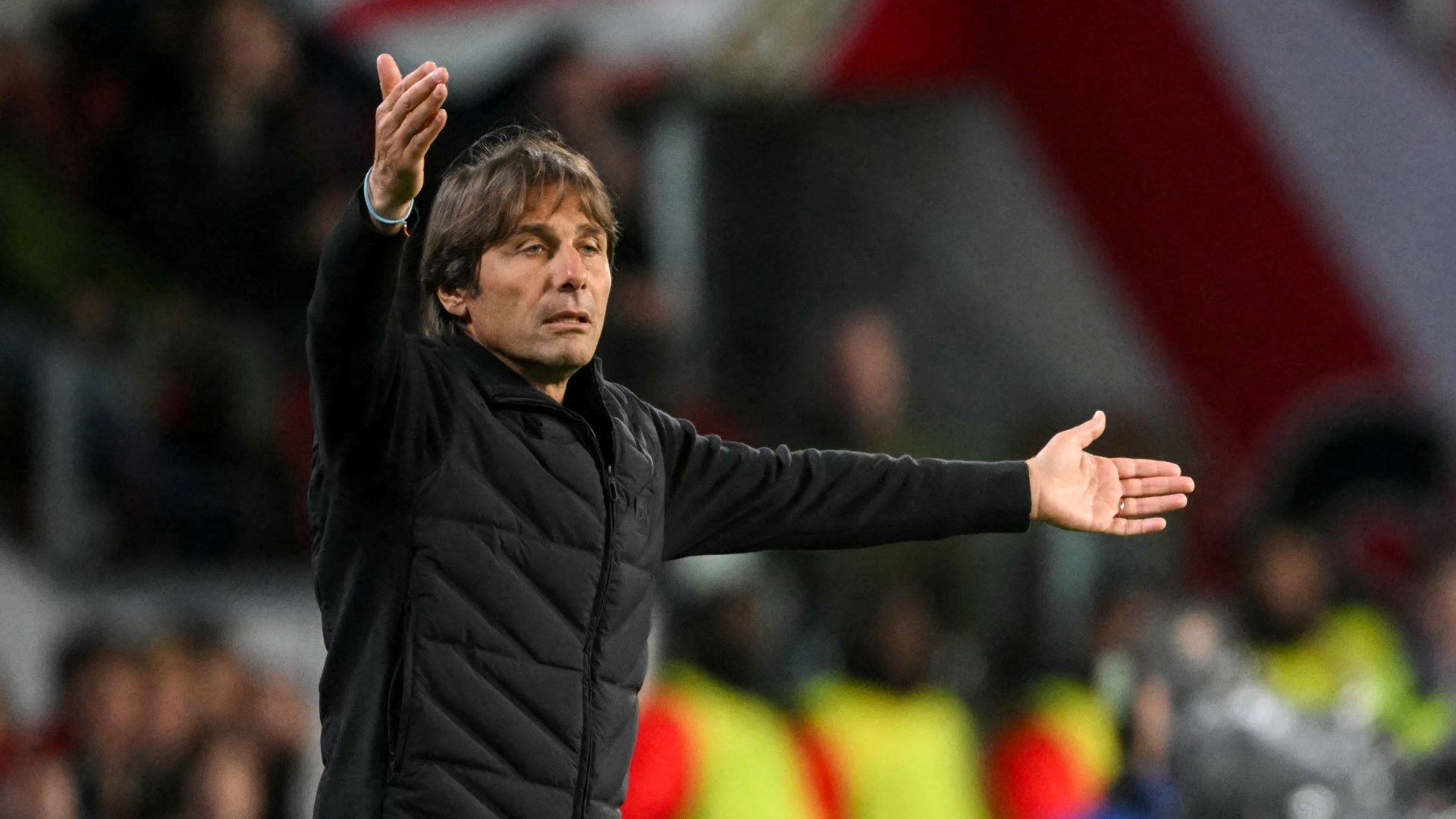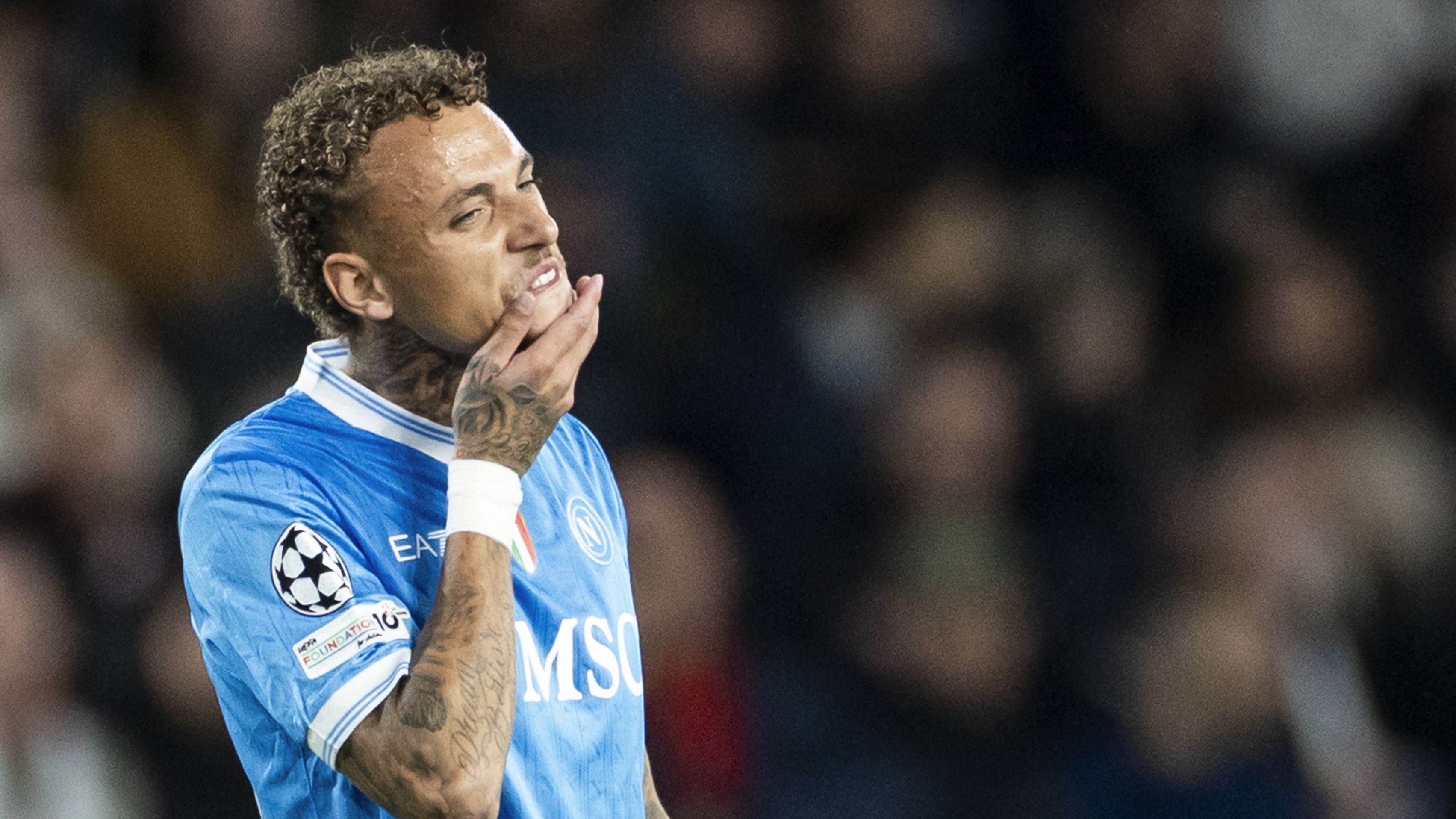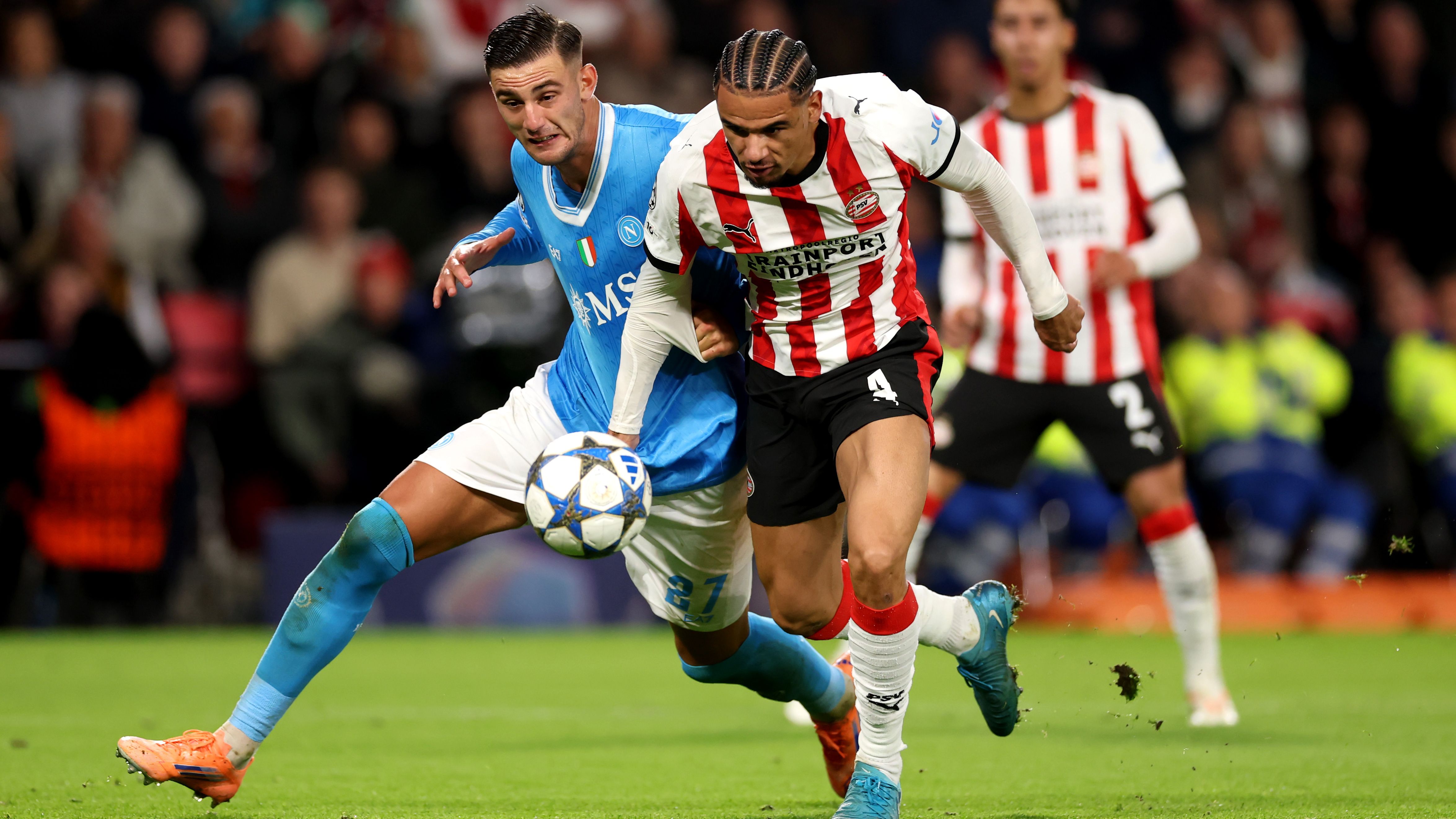


Noa Lang’s Growing Frustrations with Antonio Conte at Napoli
In the world of football, where high expectations often collide with on-field realities, Noa Lang and Antonio Conte‘s relationship at Napoli has quickly become a focal point of tension. This piece delves into the Dutch winger’s recent challenges following a disappointing return to his former club, PSV, highlighting the communication gaps and mounting pressures within the team.
Lang’s Disappointment in the Wake of Napoli’s Heavy Loss to PSV
Returning to PSV should have been a triumphant moment for Lang, but it transformed into a frustrating ordeal as Napoli endured a crushing 6-2 defeat in Eindhoven. The player, who honed his skills in PSV’s youth system, was once again omitted from the initial lineup and only entered the game in the 58th minute, stepping in for Billy Gilmour. Throughout the current season, Lang has appeared in merely six matches, exclusively as a substitute, accumulating just 110 minutes of play since his high-profile €28 million transfer in July.
Expressing His Irritation Post-Match
Lang openly shared his dismay right after the final whistle, conveying a sense of outrage as he discussed his unmet expectations for more playing time, especially amid such a lopsided loss. Despite his dedication in training sessions, he acknowledged that lineup choices remain beyond his influence, leaving him with no option but to endure the circumstances temporarily. This openness underscores a deeper unease about his position within the squad.
Early Tensions in Lang’s Tenure Under Conte
At 26 years old, Lang committed to a contract extending to 2030, yet mere months into his stint at Napoli, signs of discord between him and the coach are evident. His remarks point to a significant lack of dialogue with Conte, sparking worries about how he fits into the team’s strategy moving forward.
Lang’s Direct Comments on the Defeat and His Situation
During his interview, Lang didn’t shy away from criticizing the team’s display and his own limited involvement: “I’d rather hold back,” he expressed with a blend of fury and regret. “The scoreline speaks volumes,” Lang reflected on Pickx Sports. “Conceding six goals to PSV is utterly disgraceful; we never stood a chance and were completely dominated.” He went on to say: “Was I kept out of the game? I’m at a loss for what more I can do. I’m pushing myself in practice every day. With my contract in place, I must deal with things as they stand right now.”
Limited Interactions with the Coach
Furthermore, Lang revealed: “I don’t chat with him [Conte] much at all. We’ve only talked once. I’m feeling perplexed after this outcome. It’s wiser to stay quiet for now.”
Conte’s Response and Emphasis on Team Unity
When prompted soon after Lang’s statements, the coach avoided centering the discussion on any single player. Before touching on his winger’s concerns, Conte stressed the importance of prioritizing the group’s needs over individual agendas.
Maintaining Focus on the Collective
“Our conversation should center on the entire squad, not just one member,” he explained. “Spotlighting an individual can lead to self-centered behavior, which threatens our campaign. He must persist in his efforts. Should I choose to include him, he plays; if not, he’ll remain reserved.”
Napoli’s Recent Struggles and Upcoming Challenges
The team’s recent performance has amplified the strain, with consecutive setbacks against Torino and PSV, alongside difficulties in maintaining consistency in the Champions League after two group stage losses. Although Napoli holds third place in Serie A, just a single point from the top spot held by AC Milan, the demand on Conte to stabilize the side is intensifying.
Lang’s Expected Contributions Versus Current Reality
Having delivered 11 goals and 10 assists during his time at PSV last season, Lang was anticipated to inject innovation and variability into Napoli’s offensive play. Contrarily, he is currently sidelined, even as the team grapples with declining results and elevated demands.
The Road Ahead for Napoli
The title holders now face a demanding schedule, starting with a Serie A clash against Inter, who are tied on points in second, followed by crucial Champions League encounters with Eintracht Frankfurt, Qarabag, and Benfica-games essential for keeping their European hopes alive.
What’s Next for Lang and Conte at Napoli
For Lang, the way forward involves steadfast effort, patience, and earning Conte’s confidence, all while his contract extends until 2030. Without improvements, his dissatisfaction might escalate into a larger issue. Meanwhile, Conte’s effectiveness will be assessed not only by outcomes but also by his ability to manage prominent figures in the locker room. As tensions rise, Napoli’s forthcoming games could define both the season’s trajectory and Lang’s prospects with the club.
The Root of Frustration: Napoli Winger’s Concerns with Antonio Conte
Background on the Napoli Winger’s Situation
In the fast-paced world of professional football, communication between players and coaches can make or break a team’s success. Recently, a key Napoli winger has voiced his frustrations over what he describes as limited interactions with head coach Antonio Conte. This issue highlights the challenges that arise when high-profile players feel disconnected from their manager’s vision, especially in a league as competitive as Serie A.
The winger in question has been a standout performer for Napoli, known for his speed, dribbling skills, and ability to create scoring opportunities. However, his comments suggest that infrequent one-on-one meetings with Conte have left him feeling undervalued and out of the loop on tactical decisions. This frustration isn’t isolated; many athletes in elite sports report similar issues when coaches prioritize team drills over individual feedback.
- Key factors contributing to the winger’s dissatisfaction:
- Infrequent personal sessions: Unlike some coaches who hold regular individual reviews, Conte’s approach emphasizes group training, which may leave players like the winger seeking more personalized guidance.
- High expectations from fans and media: As a Napoli star, the pressure to perform can amplify feelings of isolation if direct communication with the coach is lacking.
- Cultural differences in coaching styles: Conte, with his background in Italian football management, often focuses on discipline and collective effort, which might not align with a winger’s need for creative freedom on the pitch.
Conte’s Warning on Selfishness and Its Implications
Antonio Conte is no stranger to delivering tough love, and his recent warning to the Napoli winger about “selfishness” has added fuel to the fire. During a post-match press conference, Conte reportedly emphasized the importance of team-oriented play, accusing the player of prioritizing individual glory over collective success. This rebuke underscores Conte’s philosophy, which prioritizes defensive solidity and unit cohesion-traits that defined his successful stints at clubs like Inter Milan and Juventus.
The warning has sparked debates among football analysts and fans alike. On one hand, it’s a classic Conte move: pushing players to put the team first, which can lead to better overall performance. On the other, it raises questions about how such criticisms affect player morale. The winger’s response in interviews has been measured but firm, stating that he wants to contribute more effectively but needs clearer direction from the coaching staff.
- Potential reasons behind Conte’s accusation of selfishness:
- Overemphasis on solo runs: The winger’s style often involves high-risk plays, like cutting inside for shots instead of passing to teammates, which Conte might see as disruptive to the team’s structured attacks.
- Statistics highlighting the issue: Data from recent matches show the winger taking more shots per game than his peers, potentially at the expense of assists, aligning with Conte’s call for more balanced contributions.
- Historical context in Conte’s career: Coaches like Conte have a track record of calling out individualistic behavior, as seen in his past dealings with players at Chelsea and Tottenham, where he demanded greater accountability.
How Limited Interaction Impacts Team Dynamics in Football
When a player like the Napoli winger feels sidelined, it can ripple through the entire squad, affecting everything from training sessions to match-day performance. Experts in sports psychology point out that strong coach-player relationships are crucial for maintaining motivation and preventing burnout. In Conte’s case, his intense, results-driven approach might be clashing with the winger’s desire for more collaborative discussions.
To address this, teams often implement strategies like:
- Regular feedback loops: Scheduling mandatory one-on-one meetings to ensure players feel heard and aligned with the coach’s tactics.
- Team-building exercises: Activities that foster better communication, such as video analysis sessions where players and coaches review games together.
- Mentorship programs: Pairing experienced players with newcomers to bridge any gaps in understanding the coach’s expectations.
This situation also sheds light on broader trends in football management, where selfishness warnings are common tools for enforcing discipline. For instance, similar dynamics have played out in other clubs, like when managers at Manchester United or Liverpool have had to manage star players’ egos. The Napoli winger’s case serves as a reminder that even top-tier athletes need emotional support to thrive.
Steps Toward Resolution and Better Player-Coach Relations
Resolving these tensions could involve proactive measures from both sides. The winger might benefit from initiating open dialogues with Conte, perhaps through team captains or sports psychologists, to express his needs without escalating conflicts. Meanwhile, Conte could adapt his style slightly, incorporating more individualized coaching elements without losing his core principles.
Digging deeper into football analytics, tools like performance tracking software can help identify patterns of selfishness, allowing for data-driven conversations rather than emotional confrontations. This approach not only addresses immediate frustrations but also promotes long-term growth for the player and the team.
In analyzing similar cases, we’ve seen positive outcomes when coaches and players find common ground-such as improved on-field chemistry and higher win rates. For Napoli fans, watching how this unfolds could be pivotal for the club’s Serie A aspirations and beyond.
The Bigger Picture: Lessons for Football Fans and Aspiring Players
Feedback from players and coaches like this often provides valuable insights into the human side of professional sports. If you’re a football enthusiast or an aspiring athlete, understanding these dynamics can help you appreciate the complexities behind the game. Keywords like “player-coach communication in football” and “managing selfishness in sports” highlight how these issues are perennial challenges that teams must navigate.
By focusing on empathy and strategy, situations like the Napoli winger’s frustration with Antonio Conte can evolve into opportunities for growth, ultimately strengthening the team’s pursuit of glory in competitive leagues.









